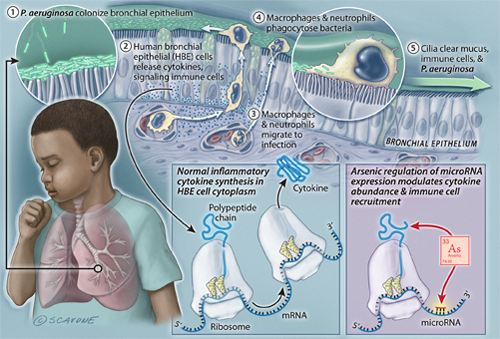
This image CAN be licensed for re-use by Kestrel Illustration Studio.
How may I purchase this image for use?
Arsenic & Innate Immunity
Antibiotic resistant Pseudomonas aeruginosa (P. aeruginosa) is an opportunistic pathogen that infects the lungs of patients with Cystic Fibrosis, pneumonia, chronic obstructive pulmonary disease (COPD) and bronchiectasis. The Dartmouth Toxic Metals Superfund Research Program (SRP) is studying the effect arsenic has on the innate immune response in the lungs. This figure was created to accompany an SRP grant proposal.
In a normal immune response to P. aeruginosa infection, human bronchial epithelial cells release cytokines that signal neutrophils and macrophages to phagocytose the bacteria and clear the infection.
With arsenic present, the cytokine response is reduced by 50%, allowing the bacteria to remain, resulting in a prolonged, chronic infection. The Dartmouth Toxic Metals SRP is investigating several pathways where arsenic might regulate microRNA expression modulating the cytokine response.
Adobe® Photoshop® & Adobe® Illustrator®.
© William Scavone. All Rights Reserved.
